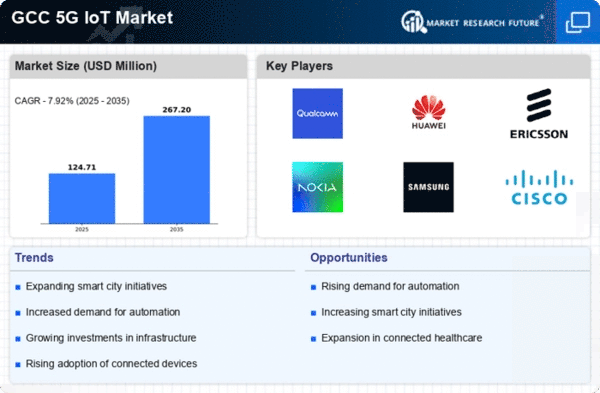Rising Demand for Smart Devices
The proliferation of smart devices in the GCC region is a key driver for the 5g iot market. As consumers increasingly adopt smart home technologies, wearables, and connected appliances, the demand for seamless connectivity intensifies. Reports indicate that the number of connected devices in the GCC is expected to reach over 1 billion by 2026, highlighting a substantial growth trajectory. This surge in device adoption necessitates robust 5g infrastructure to support high-speed data transfer and low latency, which are critical for the functionality of these devices. Consequently, telecommunications companies are investing heavily in 5g networks to cater to this growing demand, thereby propelling the 5g iot market forward.
Government Support and Regulation
Government initiatives in the GCC are significantly influencing the 5g iot market. Regulatory bodies are actively promoting the deployment of 5g technology through favorable policies and incentives. For instance, the UAE government has set ambitious targets for digital transformation, aiming to enhance the country's technological landscape. This includes investments in 5g infrastructure, which are projected to exceed $1 billion by 2025. Such government backing not only accelerates the rollout of 5g networks but also fosters an environment conducive to innovation in IoT applications. As a result, businesses are more likely to invest in 5g solutions, further driving the growth of the 5g iot market.
Enhanced Data Analytics Capabilities
The advent of advanced data analytics tools is transforming the landscape of the 5g iot market. With the ability to process vast amounts of data generated by IoT devices, businesses can derive actionable insights that drive decision-making. The integration of 5g technology enhances data transmission speeds, allowing for real-time analytics. In the GCC, companies are increasingly leveraging these capabilities to optimize operations and improve customer experiences. For instance, the retail sector is expected to invest over $500 million in IoT analytics solutions by 2026. This growing emphasis on data-driven strategies is likely to stimulate demand for 5g solutions, thereby fostering growth in the 5g iot market.
Emergence of Smart Transportation Solutions
The development of smart transportation systems is a crucial driver for the 5g iot market. As urbanization accelerates in the GCC, the need for efficient transportation solutions becomes paramount. 5g technology enables the implementation of connected vehicles and intelligent traffic management systems, which can significantly reduce congestion and enhance safety. The GCC governments are investing heavily in smart transportation initiatives, with projected expenditures exceeding $2 billion by 2027. This investment is likely to create a robust demand for 5g infrastructure to support these advanced systems. Consequently, the growth of smart transportation solutions is expected to have a positive impact on the 5g iot market.
Industrial Automation and Smart Manufacturing
The shift towards industrial automation in the GCC is a significant driver for the 5g iot market. Industries are increasingly adopting IoT solutions to enhance operational efficiency and reduce costs. The integration of 5g technology facilitates real-time data exchange, enabling smarter manufacturing processes. For example, the manufacturing sector in Saudi Arabia is projected to grow by 30% by 2030, largely due to advancements in automation and IoT. This trend necessitates the deployment of 5g networks to support the high data throughput required for automated systems. Consequently, the demand for 5g-enabled IoT solutions is expected to rise, further propelling the 5g iot market.
















